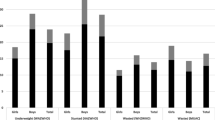Abstract
Severely malnourished children (26), weight for age 55.27±3.17, were identified in a colony of predominantly Muslim urban slum dwellers of low economic status. An equal number of normally nourished children matched for age, sex and per capita income were identified. A strong relation was found between nutritional status of the subjects and educational level of their mothers (P<0.025). Father's education was unrelated to childrens' nutritional status. A thirty seven point questionnaire was administered to the mothers to record their nutritional knowledge, attitudes and practices (KAP). Analysis revealed that better KAP in relation to 16 of these 37 questions was not associated with better nutritional status. Seven questions were found to have only a weak association. The remaining 14 questions were identified as important for a nutrition education programme. Comparison of nutritional KAP score based on these 14 questions in case of mothers of normal and severely malnourished children revealed a significantly higher score in the former. Questions related to growth monitoring and breast feeding were not found to be important. No significant association was found between mothers' KAP and educational level. It is concluded that (i) Maternal education and KAP are significantly and independently associated with childrens' nutritional status. (ii) The content areas of knowledge, attitudes and practices significantly associated with nutritional status pertain to nutritional requirements of children, nutritional value of foods, immunisation, hygiene, oral rehydration and diarrhea.
Similar content being viewed by others
References
William CD. Self help and nutrition.Lancet 1954; 2: 323.
WHO. Measuring change in nutritional status. Guidelines for assessing the nutritional impact of supplementary feeding programmes for vulnerable groups. Geneva.WHO, 1983.
Mathur P, Bijlani RL, Tandon BN. Nutritional status in relation to socio-economic level and nutritional knowledge.Indian J Public Health 1986; 30: 113–123.
Behar M. Protein calorie deficit in developing countries. In: Moss NH and Mayer J. (Eds.)Food and Nutrition in Health and Disease. New York. New York. Academy of Sciences, 1977.
Gwatkin DR. Nutrition education: an overview of the issues.Food Nutr 1985; 7: 55–63.
Nabarro D. Social, economic, health and environmental determinants of nutritional status.Food Nutr 1984; 6: 18–32.
Abbi R, Christian P, Gujial S, Gopaldas T. Nutrition knowledge of mothers and nutritional status of children (Abstract).Proceedings of Nutrition Society of India 1988; 34: 111.
Author information
Authors and Affiliations
Rights and permissions
About this article
Cite this article
Gupta, M.C., Mehrotra, M., Arora, S. et al. Relation of childhood malnutrition to parental education and mothers’ nutrition related KAP. Indian J Pediatr 58, 269–274 (1991). https://doi.org/10.1007/BF02751136
Issue Date:
DOI: https://doi.org/10.1007/BF02751136



